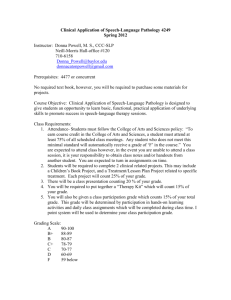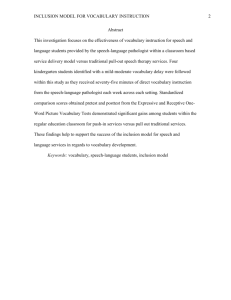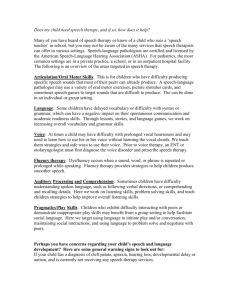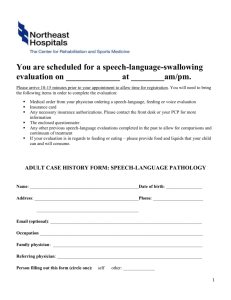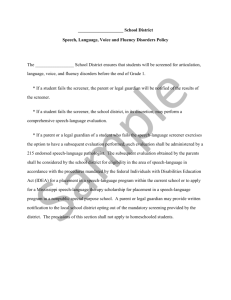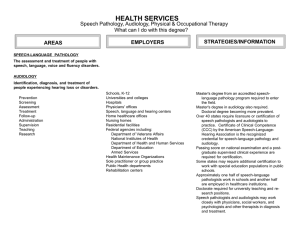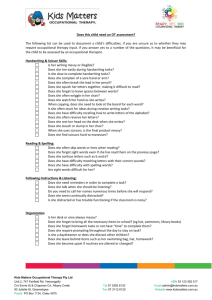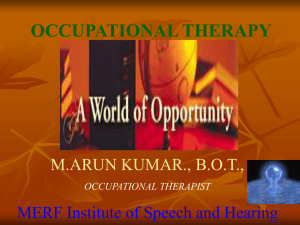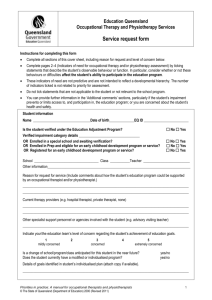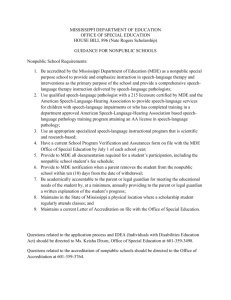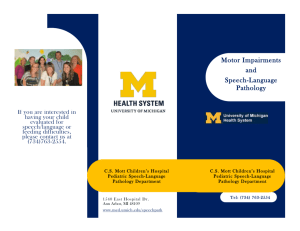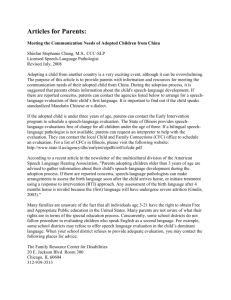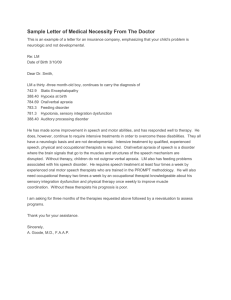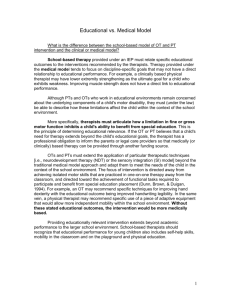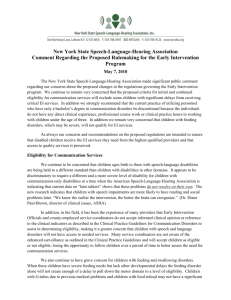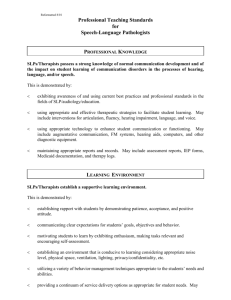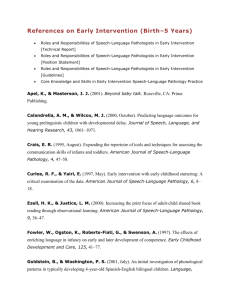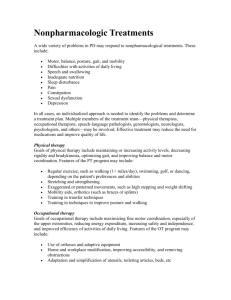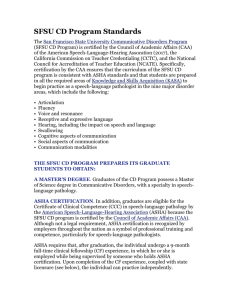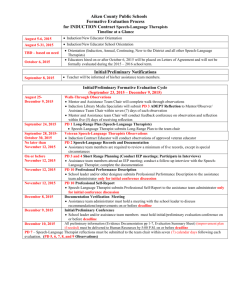A Parent`s Guide to Pediatric Therapy
advertisement
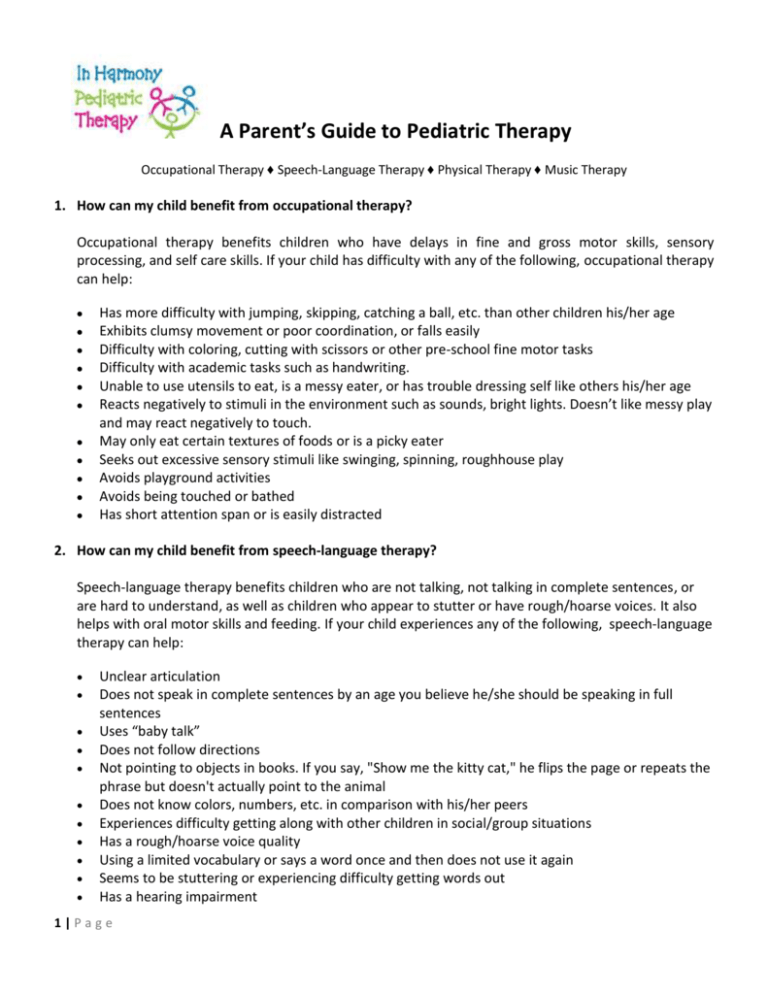
A Parent’s Guide to Pediatric Therapy Occupational Therapy ♦ Speech-Language Therapy ♦ Physical Therapy ♦ Music Therapy 1. How can my child benefit from occupational therapy? Occupational therapy benefits children who have delays in fine and gross motor skills, sensory processing, and self care skills. If your child has difficulty with any of the following, occupational therapy can help: Has more difficulty with jumping, skipping, catching a ball, etc. than other children his/her age Exhibits clumsy movement or poor coordination, or falls easily Difficulty with coloring, cutting with scissors or other pre-school fine motor tasks Difficulty with academic tasks such as handwriting. Unable to use utensils to eat, is a messy eater, or has trouble dressing self like others his/her age Reacts negatively to stimuli in the environment such as sounds, bright lights. Doesn’t like messy play and may react negatively to touch. May only eat certain textures of foods or is a picky eater Seeks out excessive sensory stimuli like swinging, spinning, roughhouse play Avoids playground activities Avoids being touched or bathed Has short attention span or is easily distracted 2. How can my child benefit from speech-language therapy? Speech-language therapy benefits children who are not talking, not talking in complete sentences, or are hard to understand, as well as children who appear to stutter or have rough/hoarse voices. It also helps with oral motor skills and feeding. If your child experiences any of the following, speech-language therapy can help: Unclear articulation Does not speak in complete sentences by an age you believe he/she should be speaking in full sentences Uses “baby talk” Does not follow directions Not pointing to objects in books. If you say, "Show me the kitty cat," he flips the page or repeats the phrase but doesn't actually point to the animal Does not know colors, numbers, etc. in comparison with his/her peers Experiences difficulty getting along with other children in social/group situations Has a rough/hoarse voice quality Using a limited vocabulary or says a word once and then does not use it again Seems to be stuttering or experiencing difficulty getting words out Has a hearing impairment 1|Page Asking for repetitions of a command or question. Appears as if he/she is not paying attention Poor social interaction, dynamics with peers and adults Drools or postures with an open mouth Unable to eat a variety of foods or has a limited diet 3. How can my child benefit from physical therapy? Physical therapy is beneficial to children who have a physical impairment or developmental delay which might include the following symptoms: Muscle weakness Abnormally low or high muscle tone Limited joint mobility Poor balance Torticollis Difficulty with gross motor skills such as walking, running, playing on playground equipment, stair climbing 4. How can my child benefit from music therapy? Music Therapy is the clinical and evidence-based use of music interventions to accomplish individualized goals. Music therapists also provide adaptive music lessons for students. Music therapy outcomes include: Increased attention and increased socialization Improve behavior, verbal skills, and cognitive skills Enhance auditory processing and sensory-motor skills Decrease self-stimulation and agitation Increase self expression Music therapists assess the following through musical responses: Emotional well being Physical health Social functioning Communication abilities Cognitive skills This information provided courtesy of: In Harmony Pediatric Therapy 4280 Hickory Flat Highway, Suite 108 ♦ Canton, Georgia 30115 770-345-2804 www.InHarmonyPediatricTherapy.com 2|Page
